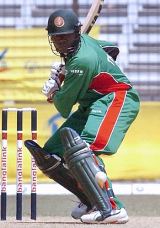Kenya's board battles to overcome predecessor's legacy
Martin Williamson takes a look inside Kenya, where the new board are struggling to overcome a lack of funding, a paucity of sponsors and the legacy of the old regime
Martin Williamson
05-Sep-2006
|
|

|
"We understand how important corporate sponsorship is to the game because of the players' well being among other things, but it has also not been easy to get sponsors to come on board," Tom Tikolo, the board's chief executive, told The Nation. "There seems to be a general apathy among prospective sponsors. Some of those we have approached have simply turned us down, especially with the team not doing so well. Others have asked us for more details which we are providing."
The old regime headed by Sharad Ghai was ousted in May 2005, but it took almost a year for the new board to resolve many outstanding accounting and logistic issue which it inherited, not least debts totalling more than $500,000. But perhaps the most damaging legacy of the previous era is that cricket has been left with a tarnished image inside the country, and that will take time to change.
But the national side has failed to perform since reaching the World Cup semi-finals in 2003, and a string of defeats have been accompanied by player unrest which has seen several strikes. One source admitted that the World Cup success had been a mixed blessing as it had led many to assume Kenya were the finished product when, he admitted, they "got lucky".
Kenya were whitewashed 3-0 at home by Bangladesh last month, and since their World Cup success have only two wins against Zimbabwe to their credit in matches against major countries.
There is an increasing acceptance inside Kenya that expectations for the 2007 World Cup should be kept low-key, and the real target has to be to groom emerging youngsters for the 2011 tournament, with qualification for that being the first goal. The side contains several players in their mid 30s, and with the exception of Steve Tikolo, who will be 39 in 2011 but is still likely to be a class act, the team will need to be rebuilt around the next generation.
Kenya are also handicapped by the gap in funding between them and the Full Member countries. Whereas the likes of Bangladesh and Zimbabwe receive several million dollars a year from the ICC, Kenya get $70,000 plus another $125,000 which in largely used to pay for Roger Harper, the coach, and other training camps.
Unless a sponsor can be found, there is simply no money to enable Kenya's players to be put on full-time contracts. It is also hard to see how they can be expected to fund trips abroad to gain the expereince they so desperately need.
The Under-19 and Under-15 sides contain some talent, and the board is working hard to improve the structure at other age levels. But it faces a battle to get the game re-established in the country's schools.
Cricket Kenya is also up against some overtly slanted reporting in the local media which is clearly supportive of the old regime. Earlier this week, Chris Tsuma, one of the board's critics wrote an article in The Nation claiming that the development work started in the old era had been allowed to die. That overlooks the minor detail that under that regime the whole game inside the country went into rapid decline, and Kenyan cricket became an international laughing stock.
"Where were the likes of Tsuma when questions about the old regime needed to be asked," one senior official asked. "And why is he and his kind now asking the kind of questions they should have been raising then."
No-one is claiming that the Samir Inamdar board has all the answers.What they have done is to restore Kenya's tattered reputation within the ICC and actually got the national side playing matches after two years of virtual isolation. Years of decline cannot be reversed overnight, but there are signs that things are turning. There is much hard work still to be done.
The real time to judge the work done by the new board will be in a couple of years time. In the meantime, it is imperative that all stakeholders inside the country pull in the same direction.
Martin Williamson is managing editor of Cricinfo